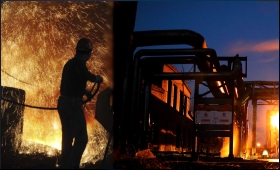|

|
Mfg. sector lacks support, fails quality: Study
|
|

|
|
| Top Stories |
 |
|
|
|
SME Times News Bureau | 21 May, 2010
Reeling under lack of funds and inadequate infrastructure, around one fifth of Indian manufacturing firms fail to produce quality products, reveals a study released Thursday by the Associated Chambers of Commerce and Industry of India (ASSOCHAM).
According to the study, a good number of domestic manufacturing processes have not been able to improve upon their precision measuring, material engineering and product control methods because extension of funds have been a major problem for industry.
"Nearly 20 percent of Indian firms are unable to produce quality products as these have machinery and equipment, already having life span of over 20 years and thus turned out to be obsolete enough not to absorb latest technological infusions for making quality products," the ASSOCHAM paper says.
"As a result, defect rates of final products in such companies are between 5-10 times than those manufacturing units in economies of scale such as USA, EU, Japan including ASEAN etc.," adds the paper.
The paper is of the view that the Indian manufacturing sector has the technical abilities to achieve a high level of precision but obstacles like higher lending rates by banks, insufficient power availability, and logistics problems are hurting the sector.
"PSUs owned banks PLR is between 12-13 percent as against 17 percent in the private sector compared to international rates ranging from 0.5 percent to 4 percent," the study points out.
The other reason as to why Indian manufacturing will take longer to come up to global levels is because of availability of quality power, views the study, adding that industrial power in India, which is about 50 percent more expensive than in China, continues to be among the most expensive in the world.
"India is also lagging behind in power generation from biomass, bagasse and waste despite its high potential," the ASSOCHAM paper adds.
The study also points out that Indian firms appear to have trouble scaling organically to world standards, carrying out R&D, innovating, creating brands, investing in long term capacity, building human resources and infrastructure.
On logistics problems faced by the Indian manufacturing firms, the ASSOCHAM paper views that manufacturing equipment and machinery are highly taxed in India both on import and excise front, and also India's poor infrastructure adds to manufacturing costs.
|
|
|
| |
|
|
|
|
|
|
|
|
|
|
|
|
|
|
| |
| Customs Exchange Rates |
| Currency |
Import |
Export |
US Dollar
|
84.35
|
82.60 |
UK Pound
|
106.35
|
102.90 |
Euro
|
92.50
|
89.35 |
| Japanese
Yen |
55.05 |
53.40 |
| As on 12 Oct, 2024 |
|
|
| Daily Poll |
 |
 |
| Do you think Indian businesses will be negatively affected by Trump's America First Policy? |
|
|
|
|
|
| Commented Stories |
 |
|
|
|
|
|
| |
|